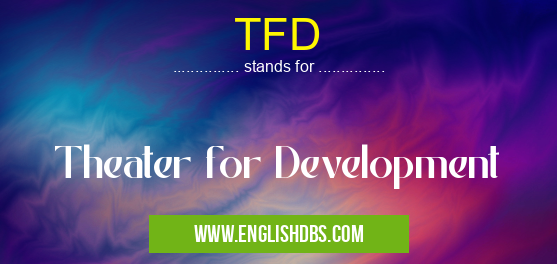What does TFD mean in DEVELOPMENT
TFD stands for Theater for Development. It is a type of creative and interactive engagement method used to address civic issues and social problems in communities. This approach uses the power of storytelling, role-playing, improvisations and acting techniques to encourage dialogue and prompt behavior change. Through this process, community members are encouraged to identify their challenges and work together to come up with solutions that benefit the entire community. By fostering collaboration, TFD helps to strengthen relations among different groups in the community. The original goal of TFD was to create an interactive theater experience for audiences that would help them become more aware of important social topics in their community. Since its inception, the concept has evolved into a powerful tool for addressing civic issues on both local and global scales. TFD is now used as an effective means of fostering public participation, cultivating positive values and improving living conditions within communities.

TFD meaning in Development in Community
TFD mostly used in an acronym Development in Category Community that means Theater for Development
Shorthand: TFD,
Full Form: Theater for Development
For more information of "Theater for Development", see the section below.
» Community » Development
Essential Questions and Answers on Theater for Development in "COMMUNITY»DEVELOPMENT"
What is Theater for Development?
Theater for Development (TFD) is an approach often used in international development and public health work that utilizes theatrical performance to engage audiences in problem solving and decision making. Through interactive performances, TFD encourages participants to develop critical thinking skills, identify potential solutions to local development issues, and mobilize community resources for development planning.
How does TFD work?
TFD generally involves the creation of a script and performance which captures key local development challenges and offers solutions from the perspective of people who are dealing with those challenges. Through dialogues between performers, audience members and facilitators discuss alternative strategies for addressing issues, reflect on their own experiences related to the challenges presented, and form action plans in order to achieve change.
What are some examples of TFD being used?
A wide range of topics can be addressed through TFD, including gender equality, health promotion, environmental stewardship, government accountability and access to services. For example, in India NGOs have used Theatre-for-Development performances to raise awareness about HIV/AIDS prevention and combat stigma associated with the disease; while in Uganda performances were used by non-profit organizations to educate communities about sustainable agricultural practices.
Who typically usesTFD?
Organizations from a range of sectors use TFD as an engaging tool for creating social change - such as community organizations advocating for policy reform; educational institutions sharing knowledge on current events; or corporations building empathy among their employees.
How has technology influenced the way TFD is implemented?
The rise of mobile technologies and digital platforms has increased the opportunities for spreading awareness around social issues as well as extending reach beyond physical theatre spaces into virtual ones located online. In addition, technologies such as live streaming video have enabled actors on stage or fieldwork sites livestreamed to viewers worldwide — thus allowing more people access to important conversations taking place through TFD initiatives.
What are some best practices when it comes to using Theatre for Development?
When designing Theatre-for-Development performances it is important to ensure fidelity between context (location/audience), content (topic/message) and process (scripting/facilitation). Additionally, incorporating participatory elements into your performance — such as invitees contributing authorship — can increase audience identification with themes explored as well relevance of solutions identified. Finally ensure that all actors involved understand objectives prior rehearsals begin so they adequately embody characters created during the scripting phase.
How do you measure impact from a Theatre-for-Development project?
Impact measurements should be tailored towards each project depending on different objectives set forth at its onset — but should take into account tangible outcomes like increases in knowledge acquisition or changes in attitude or behavior among target audiences. It's also important assess levels of awareness generated compared with previous baseline surveys — which can help gauge overall success.
What skill sets do performers need to be successful at Theatre-for-Development projects?
Initially familiarity with acting techniques such playing pretend, using body language affectively and developing dialogue between characters is paramount. Furthermore characters should embody various stances so they prepare them receive criticism positively. Identifying visual & audio cues on stage can also prove beneficial especially when showcasing emotional situations within scripts
What types of support are available before launching a Theater for Development project?
Organizations like ‘Help Act’ provide trainings and workshops that allow practitioners new skills & approaches needed design effective dramatizations specific contexts. Additionally technical advice on sourcing materials & equipment needed produce quality performances offered via same platform.
Final Words:
In conclusion, theatrical methods like TFD (Theater for Development) have proven valuable tools for creating spaces where people can discuss difficult topics with open mindsets while learning how they might contribute towards finding viable solutions that benefit everybody involved in the process. It has allowed citizens around the world to engage with one another on issues pertaining to advantages/disadvantages affecting their lives through an innovative medium that emphasizes collaboration over conflict. By providing a platform for meaningful dialogue between participants from all walks-of-life it helps further civil society by strengthening relationships amongst diverse groups while promoting sustainable development initiatives across many countries today.
